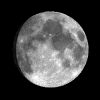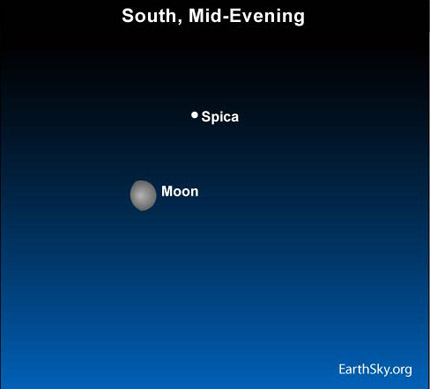Courtesy of EarthSky
A Clear Voice for Science
www.EarthSky.org

 The waxing gibbous moon glides past the star Spica in the constellation Virgo this evening. It passes relatively close to Spica for a day or two each month that Spica is visible in our night sky. It does the same with other bright stars such as Regulus in the constellation Leo, Antares in the constellation Scorpius and Aldebaran in the constellation Taurus.
The waxing gibbous moon glides past the star Spica in the constellation Virgo this evening. It passes relatively close to Spica for a day or two each month that Spica is visible in our night sky. It does the same with other bright stars such as Regulus in the constellation Leo, Antares in the constellation Scorpius and Aldebaran in the constellation Taurus.
Have you ever heard of the moon near Polaris the North Star? If someone tells you they saw the moon near Polaris, you will know that cannot be so. The moon has a set path in the sky, approximately the same path as that followed by the sun each day. Polaris is far to the north on the sky’s dome, in a part of the sky the moon never visits.
In reality, the moon’s nearness to Spica tonight is just a line-of-sight illusion. The moon never gets close to Spica in a true sense because the moon is only about one light-second from Earth, while Spica is 260 light-years away.
Spica is the 15th or 16th brightest star in the sky (as it is neck-and-neck with Antares). It is a close double star, and both stars in the Spica system are much hotter and brighter than our sun. In fact, there is some evidence that there are as many as three smaller, fainter stars in the Spica system.
Written by admin
Astronomy Picture of the Day from NASA/JPL
U.S. Naval Observator Astronomical Information center
The York County Astronomical Society
 Print This Post
Print This Post








